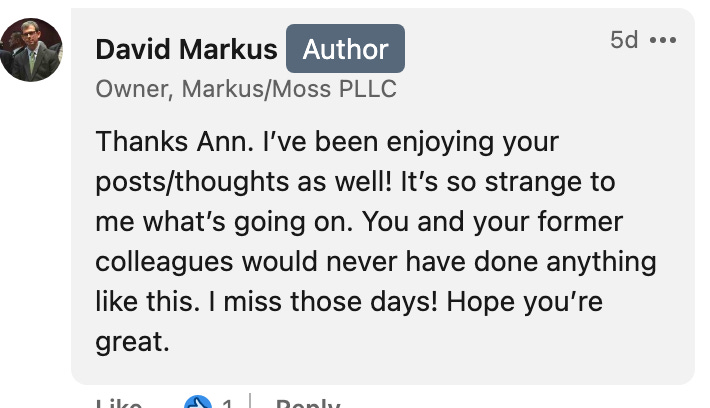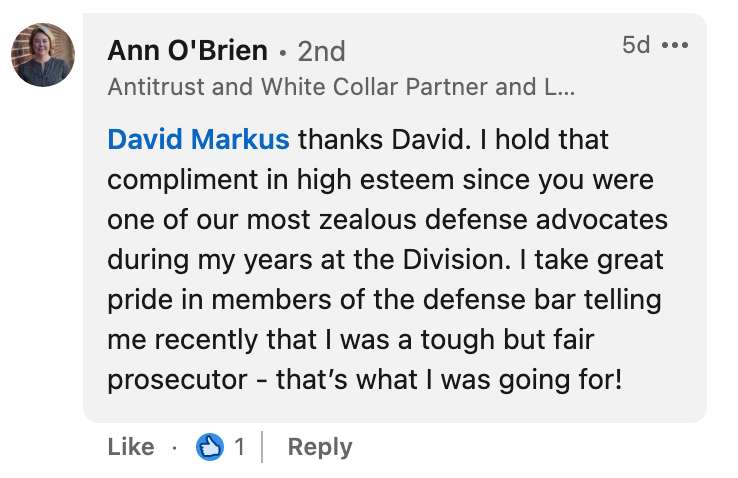Why is Ghislaine Maxwell’s Lawyer Attacking Antitrust Enforcers?
The Department of Justice Antitrust Division has gotten aggressive on white collar crime. So now there’s blowback from the defense bar, including some of the worst people in the world.
Welcome to BIG, a newsletter about the politics of monopoly. If you’d like to sign up, you can do so here. Or just read on…

In 2017, reporter Jesse Eisinger came out with a book with the best title about the Department of Justice’s sorry track record during the financial crisis. It was called “The Chickenshit Club: Why the Justice Department Fails to Prosecute Executives.” The title comes from a 2002 anecdote about James Comey, who was then running the lead prosecutorial unit in the prestigious Southern District of New York.
The story went as follows. Comey asked the assembled litigators which ones won every case. A bunch of hands went up, along with expectations of praise for what fine litigation skills their winning records implied. But Comey did not offer praise, instead he told them that a perfect record suggested not skill but cowardice. Attorneys who never lost cases were members of 'the Chickenshit Club,’ because such a record meant they were picking easy cases, rather than risking failure.
Eisinger used this metaphor to describe the collapse of justice and law in America over the course of forty years. From the Savings and Loan crisis in the 1980s, when thousands of bankers went to jail to the Enron scandals where lead executives were found guilty under George W. Bush, the DOJ had some ability to levy charges of justice against the powerful, to send them to jail. This capacity weakened. By the time of the financial crisis, and afterwards, including over monstrous crimes such as the opioid killing spree caused by the billionaire Sackler family, neither the Obama nor Trump administration’s DOJ held anyone accountable, even as prosecutors sent millions of poor people to jail.
There are many reasons for this shift. Of course there is the revolving door to big law, that network of fancy law firms that mints millionaires of former government officials. Big law is deeply problematic; I’ve long noted how these firms actively encourage firms to break the law, even in their marketing materials. But big law has always existed, so this doesn’t explain the change over time. There was the political dimension; the Obama and Trump DOJ actively cut deals for the Sacklers, for instance, at the behest of Rudy Giuliani and Mary Jo White. But such a collapse among enforcers is also a result of a degraded culture of deference to the powerful among public servants, an institutional fear of losing. I think this change is the most important and most insidious, because it pervades much of our government.
This week, the Antitrust Division is beginning to leave the Chickenshit Club. Because they are now willing to use the same standards of justice against white collar criminals that poor Americans receive, even if it means losing cases in front of juries. That’s a big claim, but I think a reasonable one. There were three criminal cases brought by the DOJ Antitrust Division decided over the past two weeks, tough cases breaking new legal and political ground. And while the Antitrust Division only lost one outright, in none of them did the prosecutors convince a jury any of these executives violated the antitrust laws. For lawyers who work for months or years prepping for a trial, this was a very tough couple of weeks.
In the most prominent case, the Division tried the powerful, politically connected CEO of DaVita Inc., a dialysis firm, for conspiring with DaVita’s competitors to suppress competition for senior-level employees by agreeing not to solicit them for each other’s companies. He was acquitted. They also tried chicken firm executives for price-fixing. The jury couldn’t make up its mind, and wouldn’t convict, though that one will be tried again. Finally, in the case against a physical therapy staffing company, the jury acquitted the defendants for wage-fixing, though did find one of them guilty of obstruction of justice.
These losses really hurt, but the Antitrust Division lost in a smart way. In terms of the legal precedent, in a stage before the jury heard the case, prosecutors established that wage-fixing is a crime and a violation of the Sherman Act. That’s a huge legal victory, even if they couldn’t get a jury to convict. But then there’s the jury, which refused to see such actions as criminal. I’m not sure why juries went the way they did, but if I had to guess, it’s probably because cheating has become normalized in American culture, so people have a tough time viewing stealing from your employees as crime. But that’s a matter of presentation. The Division has already announced it will continue to indict more executives for antitrust violations around labor, and will eventually figure out how to convey to juries that it’s illegal to steal from your employees by preventing them from accessing other job opportunities or illegally suppressing wages.
Losing two tough cases while breaking new legal ground is impressive, and shows a change in the rank careerism at the DOJ. But I’m most impressed by the chicken price-fixing case. After the second hung jury, the Division said it would bring charges again. The judge angrily demanded an explanation in person from the head of the Antitrust Division, Jonathan Kanter. Kanter traveled to a Denver court so he could stand and tell this surly judge that the Antitrust Division won’t drop the charges. Meat-packing is a sector with tremendous concentration, and Americans are suffering from the consolidated market power of the dominant poultry firms who can raise prices above what they should be. Kanter’s client, the American people, still have a case.
In response to these losses, the fancy lawyers at the antitrust bar expressed both glee and immense frustration. They are in general angry at the new way of thinking about market power. And while they are happy for the losses, these lawyers also know they lost the important legal precedents, and are going to face a lot of cases around wage-fixing from increasingly nervous executives. So they are trying the strategy of jeering the prosecutors into backing down by taunting them in public and private, accusing them of ‘witch hunts’ or incompetence or subverting justice. Comments in the press from ex-prosecutors turned big law partners for instance, are fairly routine.
“This has to be the most devastating week of losses for the criminal program in the history of the Antitrust Division,” said Ann O’Brien, a partner at BakerHostetler. O’Brien was a midlevel attorney in government who cashed out to make money in private practice, so her comments are a reasonable representation of how the bureaucrats in the antitrust bar think. On LinkedIn, she went into more detail, and dozens of colleagues in the comments chimed in with Likes and ‘attaboy’ style encouragement. Clearly, she’s striking a cord within the antitrust bar. David Markus, another self-promoting defense lawyer, wrote a blog post titled “DOJ's Antitrust division behaving amateurish.“ And he too was greeted with accolades on LinkedIn. Markus and O’Brien are friends, chatting in the comments as longtime colleagues.
Why would O’Brien and Markus make such arguments? There is of course self-interest, since O’Brien is paid to get the DOJ to back off her other clients. O’Brien has a record of seeking to shrink the law itself through the press, vehemently opposing bringing criminal charges in monopolization cases, as well as jeering at the idea of seeing wage-fixing as a crime. If you don’t have to face cases in the first place, that’s better for her clients. Same with Markus.
But I don’t believe she’s being deceptive, she really does believe her arguments. In that LinkedIn post, she discussed what she thinks in more detail. She’s angry that Kanter is refusing to drop charges against poultry executives, but her rationale is more interesting that the raw emotion. I bolded the relevant parts.
Yesterday I sat in a Denver courtroom personally pained listening to the head of the Antitrust Division be grilled by a federal judge about the application of the Justice Manual and imploring the Division to think hard about whether the interests of justice are served by putting 5 defendants through a third criminal antitrust trial. The Division seemed resolute to retry for a third time. The government is sending the message in every conference and courtroom that it is “not going to back down,” as an unnamed Division official proudly proclaims in this article.
As a 20 year DOJ prosecutor who used the principles of federal prosecution as my North Star and read the Justice Manual cover to cover, thinking about both daily, some of my proudest moments were exercising prosecutorial discretion to close investigations where I did not think we had more than 50% chance of winning, and justice would not be served by trying.
Now in private practice, I will take every defense win and use it to zealously represent my clients in criminal antitrust matters, but I take no personal joy in seeing headlines like this or hearing what I did in Denver yesterday; the Division was my professional home for 20 years and I know the great place it can be. I hope there is soul searching today in the hallowed halls of Justice.
O’Brien’s comment that her “proudest moments were exercising prosecutorial discretion to close investigations” when she thought she could not win is an important observation about what justice means to the traditionalist type, as is her ‘hallowed halls’ comment.
The Department of Justice may have been hallowed at one point, but when you let the Sackler family become billionaires by killing hundreds of thousands of people while helping to stack the jails with poor people, hallowed isn’t the word I’d choose. And yes, the Antitrust Division, while not overseeing cases like Purdue Pharma, is part of DOJ. O’Brien’s self-pitying point that watching the head of the Antitrust Division stand up to the judge induced ‘personal pain’ reflects the professional judgment of a lawyer who has no sense of what the rule of law actually means beyond letting powerful people do what they want. I wanted to ask O’Brien what she meant by some of these comments, to give her a chance to characterize her views, but she didn’t respond to my queries. Alas.
What I found as interesting here were the comment threads and discussions on LinkedIn, which reveal a social context. O’Brien had a lovely duet on the nature of justice with Markus, where they went back and forth, in a sort of ‘more in disappointment than anger’ vibe, on the audacity of the DOJ daring to indict white collar executives for wrongdoing when they weren’t sure they could win at trial.
O’Brien took great pride in being respected by the white collar defense bar, not holding the powerful to account. And who is this Markus fellow? As it turns out, Markus is a lawyer representing Ghilene Maxwell, the partner in crime of Jeff Epstein. And Markus in his defense of Maxwell was so sleazy the judge nearly sanctioned him for writing a New York Post piece saying she should be freed, just as Bill Cosby was.
It’s hard to sink lower than Jeff Epstein, but Markus managed to do it. At any rate, while citing Epstein makes you sound a bit like a conspiracy theorist, there really was a sordid and obviously widespread sex trafficking-prostitution-blackmail scandal involving elites like Bill Clinton, the royal family, Alan Dershowitz, Apollo’s Leon Black, and Larry Summers. The immensity of the Epstein conspiracy is only paralleled by the boring realization that many of these insulated elites are as predatory in private as they are in their public actions.
But such sociopathic elites would not be able to operate without a whole phalanx of somewhat wealthy functionaries like Marcus and O’Brien to protect them from any semblance of accountability. Lawyers like Marcus are why Epstein could do horrific things with kidnapped children. That’s the job of some of these well-heeled lawyers, in fact, to protect a hierarchical system of entrenched power from the same kinds of justice that we levy against the ordinary. It’s why Barry Lynn of the Open Markets Institute told the Antitrust bar at a conference a few weeks ago that these people helped Google and Facebook “shatter the frameworks of law and democracy,” and analogized their clients to Putin and Xi Jinping. These lawyers were, of course very offended, probably because Putin and Xi no longer have them on retainer.
At any rate, in the conversations between O’Brien and Markus and other antitrust white collar defense lawyers, there was deep respect and reverence for one another, a sense of professional solidarity. And that makes sense. Marcus and O’Brien aren’t billionaires or particularly important, exactly, but they are minor aristocrats, paper pushers really, tasked with protecting their betters. And so of course they despise the new vigorous spirit of taking big swings against corporate crime, because that’s not what the Antitrust Division is supposed to do. They are angry that the DOJ tried to bring justice to the powerful, because that threatens their sense of self and place in the world.
At any rate, I sincerely hope the DOJ continues to try to bring the powerful to heel, because if it does not, America will cease being a land with any semblance of the rule of law. So consider this issue my salute to the lawyers who lost these cases in front of juries. You have newfound scars, but you have the genuine honor of knowing in your bones that you did the right thing, and that you are not in the Chickenshit Club. And for that, we owe you a debt of gratitude.
Thanks for reading!
And please send me tips on weird monopolies, stories I’ve missed, or comments by clicking on the title of this newsletter. And if you liked this issue of BIG, you can sign up here for more issues, a newsletter on how to restore fair commerce, innovation and democracy. And consider becoming a paying subscriber to support this work, or if you are a paying subscriber, giving a gift subscription to a friend, colleague, or family member.
cheers,
Matt Stoller




Keep putting this out there - the real crime these days is the smokescreen of division and distraction sown by the elites of both right and left trying to use gender and culture to keep people from realizing that the real issue is poverty. If the "poors" decide to focus on what's happened to them and force a reckoning, America will rise again.
Matt, thank you for trying to expose crime at the highest levels. The fish stinks at the head and I don’t know how the average person can be expected to be/do good when the (supposed) leaders are so clearly only in for personal gain. The “anything you can get away with” mentality goes against the way I was raised. So disappointing to see so many people selling their souls….